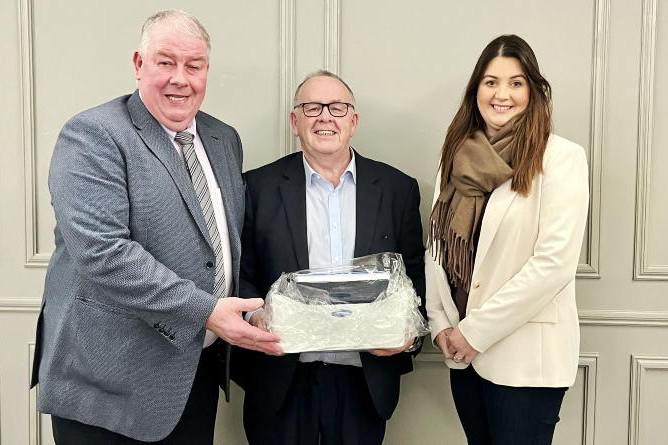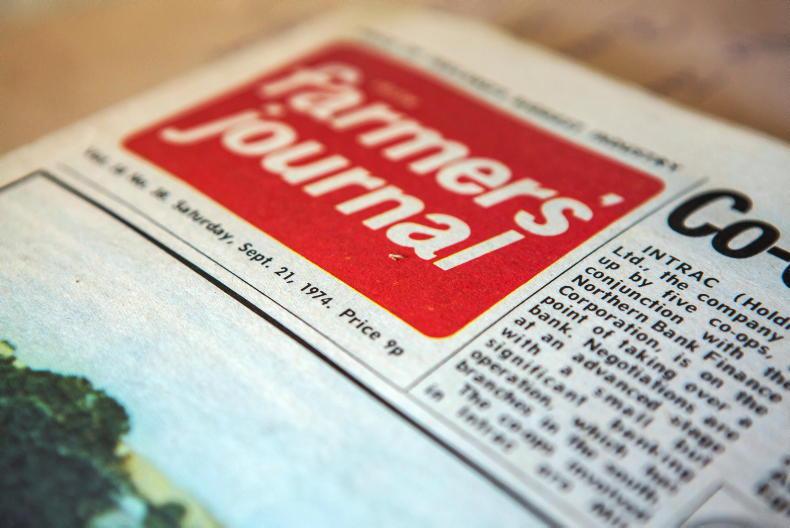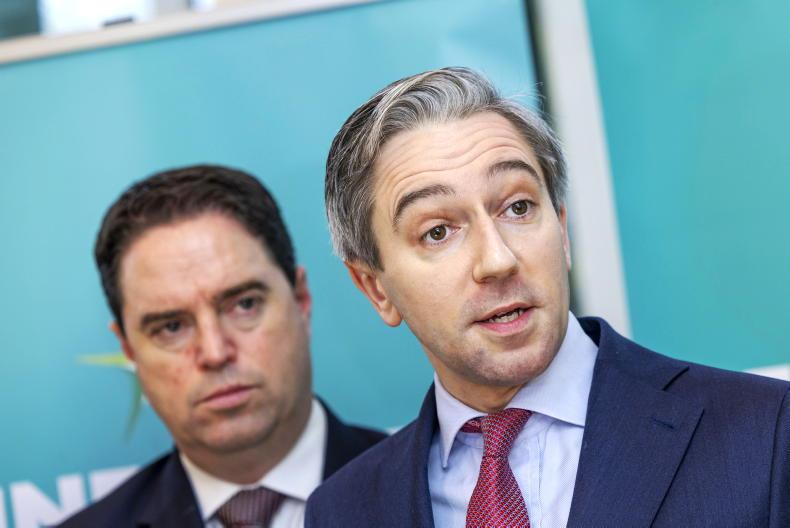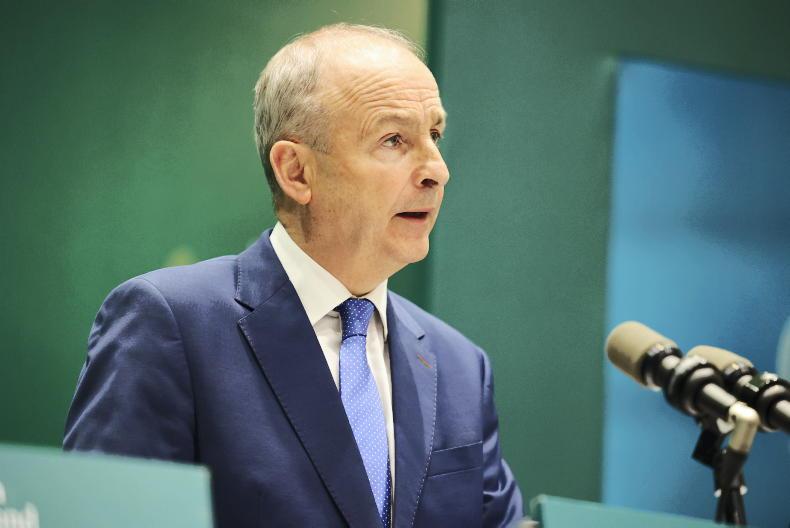Macra's annual conference often has a significant Government presence. With an election only around the next bend, this year's event in Naas, Co Kildare, was particularly charged with political energy.
Taoiseach Simon Harris was there, as was Minister for Agriculture Charlie McConalogue. Minister of State for agriculture Martin Heydon would surely have been there in any event, as a Kildare man, who spoke of his pride that Macra was returning to the county of its foundation to celebrate its 80th anniversary.
When asked by the Irish Farmers Journal why young farmers should support Fine Gael, the Taoiseach responded by saying: "What I would say to farmers is I hope they have seen from me over the last six or seven months since I've been in this role a willingness and an ability to listen to them on the issues that matter to them.
I am sick to the back teeth of the attempt by some to demonise farmers
"I am sick to the back teeth of the attempt by some to demonise farmers, the attempt by some to suggest that it is a choice between climate or farming. It is not.
"And there are some politicians who speak about farming in relation to climate in a way they would not speak about any other part of industry in this country.
Emissions dropping
"We've seen this week emissions dropping yet again in relation to agriculture. Let me be clear, we'll have to do more. Farmers will have to do more, but let's do it in a supportive, co-operative, partnership way.
"Let's look at how we can grow the CAP. Let's look at how we can pull together as 'team Ireland' to make sure we keep our nitrates derogation in place.
"So I've traveled around the country. I've been at almost every agricultural show possible. I've been listening, I've been learning, very proud of the work that Martin Heydon has done, proud of the work that this Government has done and I'd like a chance to be able to continue to make progress on these issues."
It was a strong pitch for support from farmers, one he repeated to the conference inside a few minutes later.
Minister McConalogue, who earlier in the day had been on Thomas O'Connor's sheep and cattle farm, also made his pitch to young farmers at the conference.
The issues raised were as you would imagine at a conference of rural youth, with planning for rural housing popping up alongside how to protect the derogation, TB and, above all, access to a viable future for young farmers and prospective new entrants.
Pathways are narrow for those who have the opportunity to inherit land, they are almost non-existent for people without land; or the money to buy it, which runs to millions.
Generational renewal
These are all issues for the commission on generational renewal, which is tasked with widening those pathways. Having been put in place by this outgoing Minister, they will be reporting to whoever takes up the hotseat in Agriculture House after the votes are counted and a new government is formed.
The need is urgent. It's a scary thought that the cabinet's average age is younger than that of farmers. While we have been talking about the aging profile of farming for decades, we are proceeding towards a cliff-edge and when we get there, it will be too late to look down and contemplate the situation - we will go straight over.
The engagement in the room was as you would imagine, but, to be honest, the more interesting engagement had been earlier in the day, on that farm walk the Minister and I both attended.
Thomas O'Connor's farm is as impressive as I had thought it might be. Based near Moone, just off the M9 motorway, he is operating an intensive cattle farm, finishing over 800 cattle a year.
He is also running a 500-ewe sheep flock and growing enough barley, maize and beet to have a 100% homegrown ration for his cattle until the finishing stage.
The reason I expected it to be impressive is because I have known Thomas in his role as the Irish Farmers' Association's (IFA) Kildare county chair for four years up until early this year. He is as driven, focused and hard-working as a farmer as he was a farmer representative.
Minister McConalogue, who I met in Bunclody in Wexford on Tuesday and who had been in west Cork and Kerry over the following two days, was now putting in his Saturday morning in south Kildare. It takes fair stamina to be a Government minister.
Sheep and tillage
O’Connor explained why he has expanded his ewe flock.
“The sheep are more profitable than cattle. You don't get a big cheque, but you don't run up a big bill either,” he said.
“There is a lot of work,” he conceded. “This has been a record year for prices, but I don’t see young people wanting to get into sheep, it's a little disheartening”.
Sheep also provide synergies, he said: “They're complementary to the tillage crops and for an intensive farmer like myself, they improve the environmental footprint of the overall farm.”
Having expanded the amount of cattle he fattens five-fold since taking over less than 10 years ago, he admitted that in one sense, he is “running faster to stand still”.
The significant cut in his direct payment over the Ciolos and more recent CAP reforms mean he had to intensify and increase output.
“My margin keeps dropping - a few years ago I would sell 10 cattle to buy back 11, now I have to sell 15 to buy back 16,” he said.
Full absorption
You could see Minister McConalogue absorb these truths. Despite the scale of O’Connor’s operation and it’s efficiency - his output is almost 1,500kg of beef/hectare, he can’t get way from the farm for a week at a time, taking shorter breaks instead when work is less demanding.
You have to be respectful of the previous generation, what you have is what they built
There is a huge difference between sitting in a conference centre and standing in a field, looking at fields of sugar beet, maize and forage rye for the cattle, and stubble turnips and forage rape for the sheep, which will also graze the beet tops and perhaps the rye.
The ewe flock looked in splendid condition on a fresh autumn morning. The cattle are now all housed and well fed and sheltered.
There really is nothing more that Thomas O’Connor can do to make his farm viable. His cropping is reducing his fertiliser usage, the rye only took 30 units of nitrogen to grow and every acre is being worked hard, but with an understanding of sustainability in the truest sense of the word.
Two men who work extremely hard - one making decisions for his future and that of his family. The other is making decisions that will affect tens of thousands of family farms and easy options are not sitting on the shelf, waiting to be put to work.
IFA president Francie Gorman was also an interested listener. He pointed to the plethora of rules governing cover crop planting (under ACRES) and said: “Don’t tell farmers when to sow them, they'll quickly figure it out themselves.”
Gorman’s wider point was of the value of the production from Thomas O’Connor’s farm to a global population demanding protein like never before.
“I can't see how we in Europe will allow the developing world to feed us,” he said.
“We should be focusing on our ambition to produce as much food as we can in a sustainable way. The ambition should be to get ownership of land into younger hands," he said.

Taoiseach Simon Harris, flanked by Minister of State Martin Heydon, addresses the media at the Macra national conference in Naas on Saturday.
Thomas O'Connor had one final message. “I have to work harder than my father did to make a viable income,” he said, but as matter of fact, not in self-pity.
“I don’t know how I can make this farm more viable, if margins are squeezed any tighter, I can’t expand without more land and the cost of even renting is prohibitive.”
Despite that, he reminded the young farmers assembled in his yard that “you have to be respectful of the previous generation, what you have is what they built”.
Questions about the rules
The previous evening, I had compered the Know Your Agriculture quiz final. Looking back at the 60 questions I asked of the two dozen teams that had qualified, I was struck by how many of them were about rules, regulations, schemes and the people who devise them.
I was forced to ask myself, was this a reflection of the things I deal with as a journalist?
I've decided to cut myself a little slack. The reality for all farmers is that they must live in a strictly-controlled regime, with ever-increasing layers of compliance reporting required of them.
Few sectors are as regulated as farming, because few sectors work as closely with the natural world as them and no sector occupies anything like as much land as food production does.
Not in Ireland and not anywhere where the land and the climate can combine to allow food to be grown.
So the questions will continue and the search for answers will go on. Over the next few weeks, Simon Harris, Charlie McConalogue, Martin Heydon and hundreds more politicians will engage with farmers and with the rest of Irish society trying to show they have the capacity to make everyone's lives better.
It will be intense and, for the most part, it will be an honest engagement. We are lucky our politics has not been poisoned. Let's hold our leaders to account, but with respect. They deserve that much.
Macra's annual conference often has a significant Government presence. With an election only around the next bend, this year's event in Naas, Co Kildare, was particularly charged with political energy.
Taoiseach Simon Harris was there, as was Minister for Agriculture Charlie McConalogue. Minister of State for agriculture Martin Heydon would surely have been there in any event, as a Kildare man, who spoke of his pride that Macra was returning to the county of its foundation to celebrate its 80th anniversary.
When asked by the Irish Farmers Journal why young farmers should support Fine Gael, the Taoiseach responded by saying: "What I would say to farmers is I hope they have seen from me over the last six or seven months since I've been in this role a willingness and an ability to listen to them on the issues that matter to them.
I am sick to the back teeth of the attempt by some to demonise farmers
"I am sick to the back teeth of the attempt by some to demonise farmers, the attempt by some to suggest that it is a choice between climate or farming. It is not.
"And there are some politicians who speak about farming in relation to climate in a way they would not speak about any other part of industry in this country.
Emissions dropping
"We've seen this week emissions dropping yet again in relation to agriculture. Let me be clear, we'll have to do more. Farmers will have to do more, but let's do it in a supportive, co-operative, partnership way.
"Let's look at how we can grow the CAP. Let's look at how we can pull together as 'team Ireland' to make sure we keep our nitrates derogation in place.
"So I've traveled around the country. I've been at almost every agricultural show possible. I've been listening, I've been learning, very proud of the work that Martin Heydon has done, proud of the work that this Government has done and I'd like a chance to be able to continue to make progress on these issues."
It was a strong pitch for support from farmers, one he repeated to the conference inside a few minutes later.
Minister McConalogue, who earlier in the day had been on Thomas O'Connor's sheep and cattle farm, also made his pitch to young farmers at the conference.
The issues raised were as you would imagine at a conference of rural youth, with planning for rural housing popping up alongside how to protect the derogation, TB and, above all, access to a viable future for young farmers and prospective new entrants.
Pathways are narrow for those who have the opportunity to inherit land, they are almost non-existent for people without land; or the money to buy it, which runs to millions.
Generational renewal
These are all issues for the commission on generational renewal, which is tasked with widening those pathways. Having been put in place by this outgoing Minister, they will be reporting to whoever takes up the hotseat in Agriculture House after the votes are counted and a new government is formed.
The need is urgent. It's a scary thought that the cabinet's average age is younger than that of farmers. While we have been talking about the aging profile of farming for decades, we are proceeding towards a cliff-edge and when we get there, it will be too late to look down and contemplate the situation - we will go straight over.
The engagement in the room was as you would imagine, but, to be honest, the more interesting engagement had been earlier in the day, on that farm walk the Minister and I both attended.
Thomas O'Connor's farm is as impressive as I had thought it might be. Based near Moone, just off the M9 motorway, he is operating an intensive cattle farm, finishing over 800 cattle a year.
He is also running a 500-ewe sheep flock and growing enough barley, maize and beet to have a 100% homegrown ration for his cattle until the finishing stage.
The reason I expected it to be impressive is because I have known Thomas in his role as the Irish Farmers' Association's (IFA) Kildare county chair for four years up until early this year. He is as driven, focused and hard-working as a farmer as he was a farmer representative.
Minister McConalogue, who I met in Bunclody in Wexford on Tuesday and who had been in west Cork and Kerry over the following two days, was now putting in his Saturday morning in south Kildare. It takes fair stamina to be a Government minister.
Sheep and tillage
O’Connor explained why he has expanded his ewe flock.
“The sheep are more profitable than cattle. You don't get a big cheque, but you don't run up a big bill either,” he said.
“There is a lot of work,” he conceded. “This has been a record year for prices, but I don’t see young people wanting to get into sheep, it's a little disheartening”.
Sheep also provide synergies, he said: “They're complementary to the tillage crops and for an intensive farmer like myself, they improve the environmental footprint of the overall farm.”
Having expanded the amount of cattle he fattens five-fold since taking over less than 10 years ago, he admitted that in one sense, he is “running faster to stand still”.
The significant cut in his direct payment over the Ciolos and more recent CAP reforms mean he had to intensify and increase output.
“My margin keeps dropping - a few years ago I would sell 10 cattle to buy back 11, now I have to sell 15 to buy back 16,” he said.
Full absorption
You could see Minister McConalogue absorb these truths. Despite the scale of O’Connor’s operation and it’s efficiency - his output is almost 1,500kg of beef/hectare, he can’t get way from the farm for a week at a time, taking shorter breaks instead when work is less demanding.
You have to be respectful of the previous generation, what you have is what they built
There is a huge difference between sitting in a conference centre and standing in a field, looking at fields of sugar beet, maize and forage rye for the cattle, and stubble turnips and forage rape for the sheep, which will also graze the beet tops and perhaps the rye.
The ewe flock looked in splendid condition on a fresh autumn morning. The cattle are now all housed and well fed and sheltered.
There really is nothing more that Thomas O’Connor can do to make his farm viable. His cropping is reducing his fertiliser usage, the rye only took 30 units of nitrogen to grow and every acre is being worked hard, but with an understanding of sustainability in the truest sense of the word.
Two men who work extremely hard - one making decisions for his future and that of his family. The other is making decisions that will affect tens of thousands of family farms and easy options are not sitting on the shelf, waiting to be put to work.
IFA president Francie Gorman was also an interested listener. He pointed to the plethora of rules governing cover crop planting (under ACRES) and said: “Don’t tell farmers when to sow them, they'll quickly figure it out themselves.”
Gorman’s wider point was of the value of the production from Thomas O’Connor’s farm to a global population demanding protein like never before.
“I can't see how we in Europe will allow the developing world to feed us,” he said.
“We should be focusing on our ambition to produce as much food as we can in a sustainable way. The ambition should be to get ownership of land into younger hands," he said.

Taoiseach Simon Harris, flanked by Minister of State Martin Heydon, addresses the media at the Macra national conference in Naas on Saturday.
Thomas O'Connor had one final message. “I have to work harder than my father did to make a viable income,” he said, but as matter of fact, not in self-pity.
“I don’t know how I can make this farm more viable, if margins are squeezed any tighter, I can’t expand without more land and the cost of even renting is prohibitive.”
Despite that, he reminded the young farmers assembled in his yard that “you have to be respectful of the previous generation, what you have is what they built”.
Questions about the rules
The previous evening, I had compered the Know Your Agriculture quiz final. Looking back at the 60 questions I asked of the two dozen teams that had qualified, I was struck by how many of them were about rules, regulations, schemes and the people who devise them.
I was forced to ask myself, was this a reflection of the things I deal with as a journalist?
I've decided to cut myself a little slack. The reality for all farmers is that they must live in a strictly-controlled regime, with ever-increasing layers of compliance reporting required of them.
Few sectors are as regulated as farming, because few sectors work as closely with the natural world as them and no sector occupies anything like as much land as food production does.
Not in Ireland and not anywhere where the land and the climate can combine to allow food to be grown.
So the questions will continue and the search for answers will go on. Over the next few weeks, Simon Harris, Charlie McConalogue, Martin Heydon and hundreds more politicians will engage with farmers and with the rest of Irish society trying to show they have the capacity to make everyone's lives better.
It will be intense and, for the most part, it will be an honest engagement. We are lucky our politics has not been poisoned. Let's hold our leaders to account, but with respect. They deserve that much.









SHARING OPTIONS